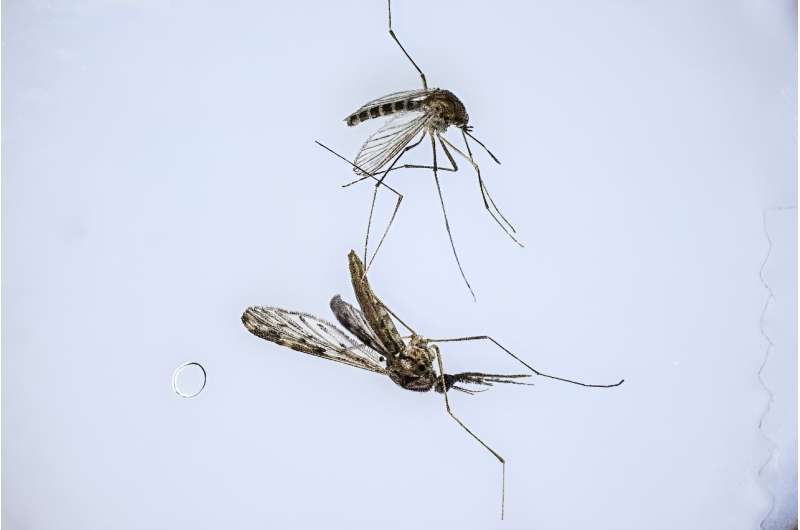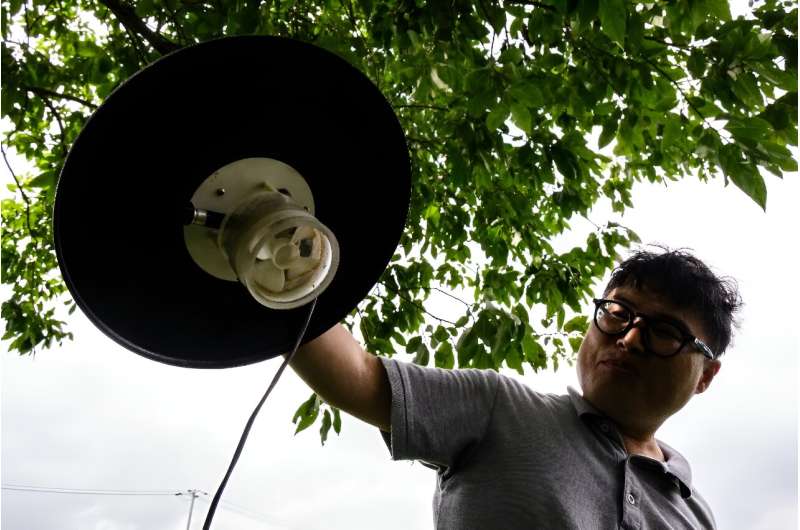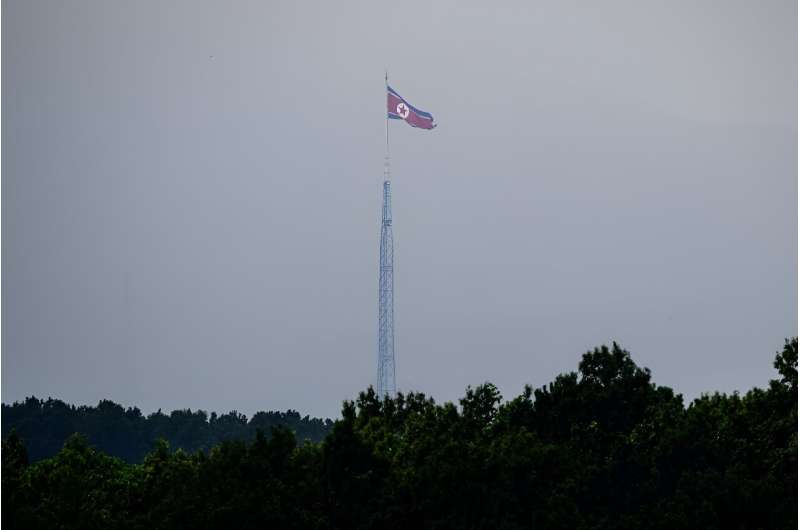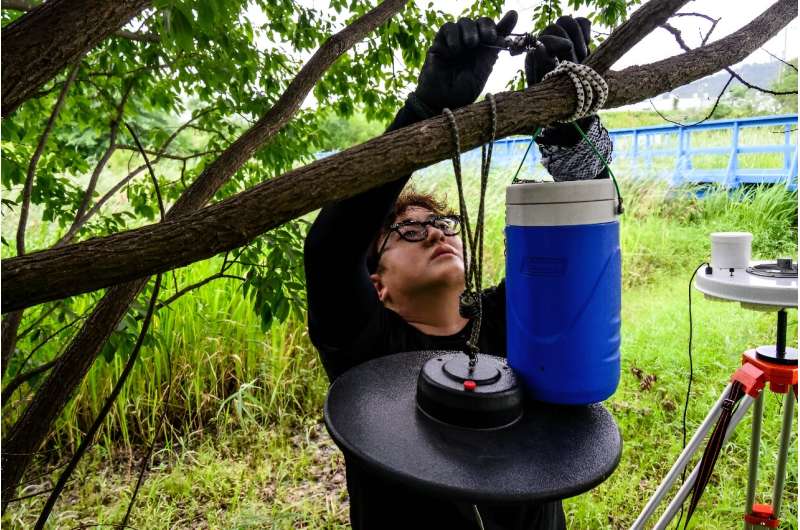As climate warms, S. Korea fights new border threat: malarial mosquitoes


South Korea issued a nationwide malaria warning this yr, and scientists allege climate change might perhaps raise extra mosquito-borne illnesses to the peninsula.
Reach the heavily fortified border that divides North and South Korea, a monitoring diagram is working 24-7—now not tracking missiles or troop movements, however catching malaria-carrying mosquitoes that might perhaps perhaps merely wicked the border.
Despite its evolved healthcare provider and a protracted time of obvious efforts, reaching “malaria-free” reputation has remained elusive for South Korea, largely due to this of its proximity to the remoted North, the achieve the disease is prevalent.
The South issued a nationwide malaria warning this yr, and scientists allege climate change, in particular warmer springs and heavier rainfall, might perhaps raise extra mosquito-borne illnesses to the peninsula unless the 2 Koreas, which live technically at battle, cooperate.
The core enviornment is the DMZ, a four-kilometer-wide no man’s land that runs the fat length of the 250-kilometer (155-mile) border.
The demilitarized zone is covered in lush forest and wetlands, and largely unvisited by folks because it used to be created after the 1953 ceasefire that ended Korean War hostilities.
The heavily mined border barrier dilemma has turn into an ecological refuge for uncommon species—an Asiatic dusky undergo used to be photographed in 2018—and scientists allege it is additionally an glorious breeding floor for mosquitoes, including malaria carriers that can soar as far as 12 kilometers.

The DMZ has stagnant water plus ‘a range of untamed animals that support as blood sources for mosquitoes to feed on’, says Kim Hyun-woo of the Korea Illness Preserve an eye on and Prevention Company.
The DMZ has stagnant water plus “a range of untamed animals that support as blood sources for mosquitoes to feed on in show to attain their eggs”, acknowledged Kim Hyun-woo, a team scientist at Seoul’s Korea Illness Preserve an eye on and Prevention Company.
South Korea once believed it had eradicated malaria, however in 1993 a soldier serving on the DMZ used to be stumbled on to were infected, and the disease has persevered ever since, with cases up almost 80 percent final yr to 747, from 420 in 2022.
“The DMZ is now not an dilemma the achieve pest control is perhaps performed,” Kim Dong-gun, an environmental biology professor at Sahmyook University in Seoul, suggested AFP.
As mosquito populations elevate, extra malaria carriers are “feeding on soldiers within the border diagram, leading to a continuous occurrence of malaria cases there”, he acknowledged.
The South Korean health authorities luxuriate in installed 76 mosquito-tracking gadgets nationwide, including in key areas reach the DMZ.

North of the border, malaria is extra widespread, with WHO info indicating almost 4,500 cases between 2021 and 2022.
‘Illness republic’
North of the border, malaria is extra widespread, with WHO info indicating almost 4,500 cases between 2021 and 2022, with the nation’s excessive poverty and meals insecurity possible exacerbating the topic.
“North Korea is a republic of infectious illnesses,” Choi Jung-hun, a inclined North Korean physician who defected in 2011 and now works as a health care provider within the South, suggested AFP.
Choi acknowledged that even supposing he lived within the north of the nation, he had treated malaria sufferers, including a North Korean soldier who had been basically based fully reach the border with the South.
Outdated-favorite instruments like feeble microscopes hampers early and correct malaria diagnoses, Choi acknowledged, while malnutrition and unhygienic water puddles and facilities beget residents in particular at possibility of the disease.
The severe flooding that struck the North this summer might perhaps beget things worse. In Pakistan, catastrophic flooding in 2022 contributed to a fivefold elevate in malaria cases yr-on-yr.
“North Korea continues to depend on outdated-favorite communal out of doorways toilets. In consequence, when floods happen, fecal water overflows, resulting within the swift unfold of (each and each form of) infectious illnesses,” Choi suggested AFP.

The South Korean health authorities luxuriate in installed 76 mosquito-tracking gadgets nationwide, including in key areas reach the DMZ.
‘So painful’
Within the final decade, round 90 percent of South Korea’s malaria sufferers were infected in areas reach the DMZ, reliable figures show—even supposing uncommon cases luxuriate in took place in other areas.
Shin Online page positioning-a, 36, used to be identified with malaria in 2022 after being hospitalized with recurring excessive fevers, however she had now not visited a border diagram that yr earlier than getting unwell.
“I no doubt don’t luxuriate in any recollection of being bitten by any bugs,” she suggested AFP of the length earlier than she turned unwell.
Scientific doctors initially notion she had a kidney infection and it took round 10 days earlier than she used to be lastly identified with the mosquito-borne disease.
Having malaria felt like “I used to be being breeze-fried on a extremely sizzling pan,” she suggested AFP, announcing it used to be so painful that in tears, “I once even begged the nurse to ideal knock me out.”
Malaria on the Korean peninsula is precipitated by the parasite Plasmodium vivax and is diagnosed to be less lethal than tropical malaria precipitated by Plasmodium falciparum, which affects many African countries.
Even so, after contracting malaria Shin developed Nontuberculous mycobacteria, a lung disease that usually affects folks with a weakened immune system.
“Malaria is a no doubt ugly disease,” she suggested AFP, adding that she hoped extra will possible be done to prevent its unfold.
But with the nuclear-armed North declaring Seoul its “main enemy” this yr and reducing off contact, because it rejects repeated offers of out of the nation abet, cooperation on malaria seems unlikely.
© 2024 AFP
Citation:
As climate warms, S. Korea fights new border threat: malarial mosquitoes (2024, August 27)
retrieved 27 August 2024
from https://medicalxpress.com/info/2024-08-climate-korea-border-threat-malarial.html
This document is enviornment to copyright. Rather then any stunning dealing for the motive of non-public survey or compare, no
segment is perhaps reproduced without the written permission. The shriek is supplied for knowledge suggestions easiest.














